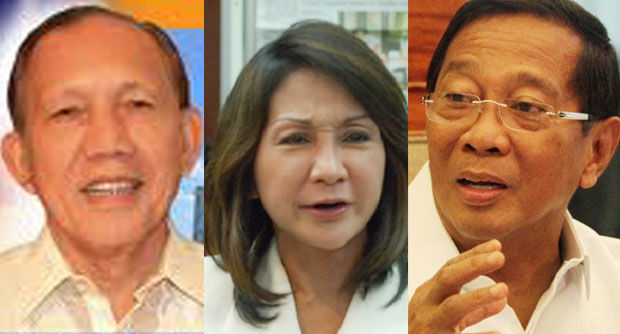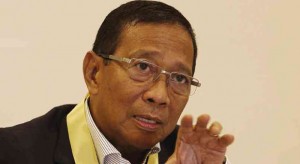In the know: Gov’t officials who defied suspension orders

From left: Former Iloilo Gov. Niel Tupas Sr., Cebu Rep. Gwendolyn Garcia and Vice President Jejomar Binay
MANILA, Philippines—Suspended Makati Mayor Jejomar Erwin “Junjun” Binay is not alone among the government officials who refused to step down after being suspended by the Office of the Ombudsman.
Mayor Binay and 21 other Makati City officials were suspended on March 11 by the Ombudsman as they faced graft in connection with the allegedly overpriced Makati Parking Building II.
Binay, however, refused to leave the city hall pending the motion for temporary restraining order his camp filed before the Court of Appeals.
INQUIRER has compiled similar incidents in the past where politicians defied the Ombudsman’s order.
Makati City Mayor Jejomar Binay
Article continues after this advertisementIn October 2006, the Department of Interior and Local Government (DILG) ordered the suspension of then Makati Mayor and now Vice President Jejomar Binay and 16 other city officials.
Article continues after this advertisementBinay was suspended after a complaint was filed by his political rival Roberto Brillante, who accused the officials of including 1,000 ghost employees at city hall.
On Oct. 13, 2006, Binay’s camp sought a temporary restraining order before the Court of Appeals to prevent the DILG and the Office of the President from acting on Brillante’s complaint.
On Oct. 17, 2006, the DILG issued the 60-day preventive suspension order against Binay.
Binay, wearing a camouflage jacket, remained inside the mayor’s office on the 21st floor while his supporters barricaded themselves at city hall and blocked interior officials and police from entering the premises and serving the order.
The mayor later got an injunction from the court.
Speaking to reporters, Binay, who was a Marine Corps reservist with the rank of colonel, wore the upper garment of a Marine battle fatigue unbuttoned. The dress bore a name patch and the insignia of a colonel on the collar.
According the Armed Forces of the Philippines (AFP), Binay could be charged with violation of Article of War No. 97 or conduct prejudicial to good order and military discipline.
“Anybody who violates the Uniform Code can be court-martialed,” the AFP said, adding Binay was “on inactive status as a reservist” and “should not be wearing the uniform.”
Interior Undersecretary Wencelito Andanar who served the suspension was met by Binay supporters who gathered at the grounds of the city hall. Unable to see the mayor, he read out the order instead to then Makati Vice Mayor Ernesto Mercado.
An army of civilian supporters held up placards with messages of loyalty to Binay while the AFP placed some 1,500 troops on standby in case they were needed to suppress any outbreak of violence in the city.
On Oct. 19, 2006, the CA granted Binay’s motion for a TRO, easing the tension at the city hall.
On Oct. 26, 2006, Malacañang asked the CA to immediately lift the 60-day TRO against Binay.
On Dec. 11, 2006, the Court of Appeals granted Binay’s petition for preliminary injunction, barring Malacañang from enforcing its suspension order against him and 16 other city officials until the court had determined the validity of the administrative complaint filed against them.
The court also stopped then Interior Secretary Ronaldo Puno and then Executive Secretary Eduardo Ermita from proceeding with the investigation of the administrative complaint filed by Brillante, which was the basis for the 60-day preventive suspension order.
On May 4, 2007, Binay was again served with a suspension order due to another complaint 10 days before the 2007 election.
Binay was then running for reelection as city mayor.
Political rival Oscar Ibay filed the complaint and accused Binay of keeping ghost employees.
Two days before the complaint was filed, the Bureau of Internal Revenue (BIR) froze the city’s bank accounts in what it said was an effort to recover P1.1 billion in unpaid withholding taxes.
Binay, however, said he was not formally informed of the complaint.
Binay on his first public hearing on May 8, 2007, wondered why the Ombudsman had sought his “preventive suspension” based on a complaint lodged by one of his local political foes in December 2006 without first giving him a copy of the complaint and allowing him to file a counteraffidavit.
Binay then told media that by the time the 10-day period which the Ombudsman gave him to file his reply had lapsed, he would have been “proclaimed” the winner in Makati.
On May 17, Binay was proclaimed Makati mayor and the suspension order against him was “deemed lifted.”
Pasay City Mayor Wenceslao Trinidad
On Sept. 1, 2006, the Office of the Ombudsman issued a six-month suspension against Pasay City Mayor Wenceslao “Peewee” Trinidad and 11 other city officials for allegedly awarding contracts on garbage collection and disposal in 2004 and 2005 without a public bidding.
Trinidad and the suspended city officials were defiant and remained at the city hall for five days until over 200 antiriot policemen from the Southern Police District (SPD) forcibly entered the building.
In January 2007, the Ombudsman ordered the ouster of Trinidad.
Trinidad, however, sought reelection in May and won.
On June 28, 2007, the Court of Appeals ruled that Trinidad’s reelection as Pasay City mayor rendered the previous dismissal order “moot and academic,” saying he no longer had administrative liability.
Associate Justice Ricardo Rosario of the 13th division, in an 11-page decision, said Trinidad was now free of administrative liability in connection with the charges filed against him.
Cebu Gov. Gwendolyn Garcia
On Dec. 19, 2012, Cebu Gov. Gwendolyn Garcia was issued a six-month preventive suspension by the Office of the President.
Garcia was found guilty of grave abuse of authority after the late Vice Gov. Greg Sanchez accused Garcia of cutting his budget by 61 percent and stripping him of authority to appoint
staffers and consultants.
A defiant Garcia holed up in her office at the Cebu Provincial Capitol after the order was issued.
On Dec. 20, 2012, Garcia asked the Court of Appeals to stop the DILG from implementing its order to suspend her from office for six months.
Pending the CA’s decision, the governor continued to defy the order and barricaded herself in the capitol even through the Christmas and New Year holidays.
On Jan. 2, 2013, the CA did not grant her request for a temporary restraining order but ordered oral arguments on her petition.
On Jan. 30, 2013, Garcia went out of the capitol to inaugurate the briefing center of Oslob Whale Watching program in Barangay Tan-awan, Oslob.
Acting Gov. Agnes Magpale ordered provincial administrator Eduardo Habin to padlock her office.
On June 19, 2013, a week before Garcia’s term as governor ended, she reported back to work and immediately sacked Habin.
In the 2013 elections, Garcia ran in Congress and won as representative of Cebu’s third district.
Iloilo Gov. Niel Tupas Sr.
On Jan. 12, 2007, the Ombudsman dismissed Iloilo Gov. Niel Tupas Sr. along with provincial board members Domingo Oso and Cecilia Capadosa after being found guilty of malversation of public funds through falsification of public documents.
The governor was also accused of approving the transfer and release of P85,000 from the Community Direct Action Project (CDAP) to the Provincial Board Members League of the Philippines (PBMLP).
A defiant Tupas refused to obey the orders of the Ombudsman and the DILG who was implementing the suspension order.
He holed up at the third floor of the governor’s office while around 700 of his supporters continued their campout on the grounds of the capitol.
On Jan. 17, 2007, the Court of Appeals in Cebu City issued a 60-day temporary restraining order on the enforcement of the dismissal order against the governor.
A two-page order released by the appellate court barred the Ombudsman, DILG, and agencies from removing Tupas from office during the period.
Some 200 battle-equipped policemen stormed the capitol, smashed glass doors and destroyed padlocked iron gates in their attempt to arrest the governor but was stopped by the TRO.
On March 15, 2007, the court issued a permanent injunction barring the implementation of the orders of the Ombudsman, which the Supreme Court later affirmed. With reports from Inquirer Research


